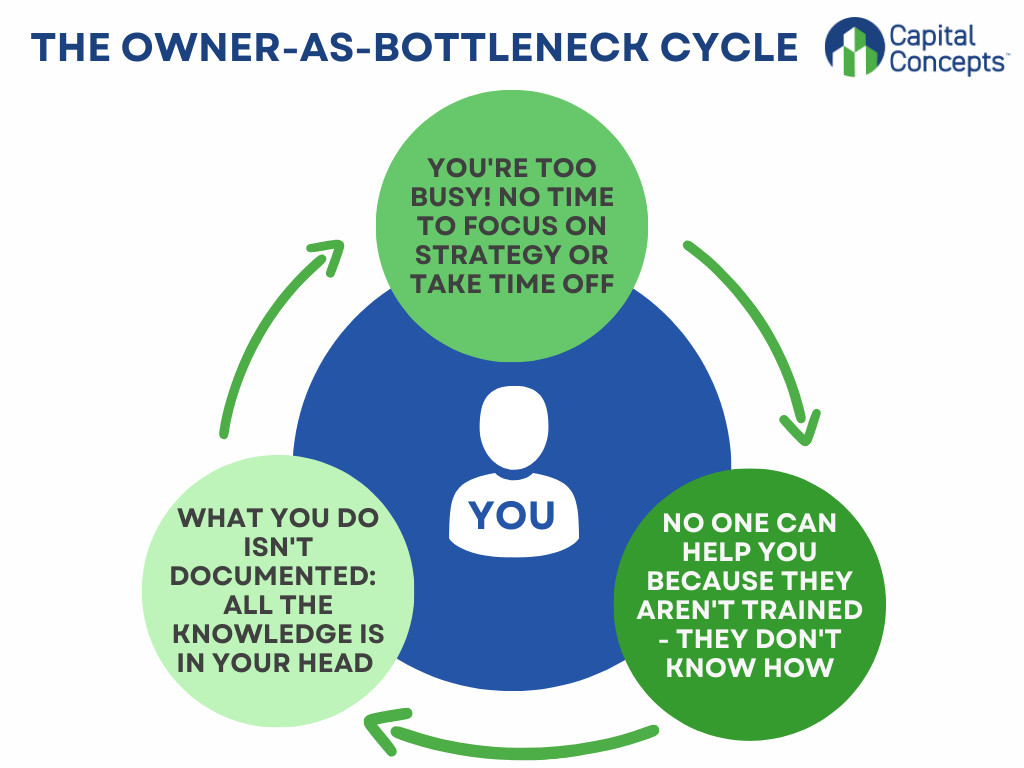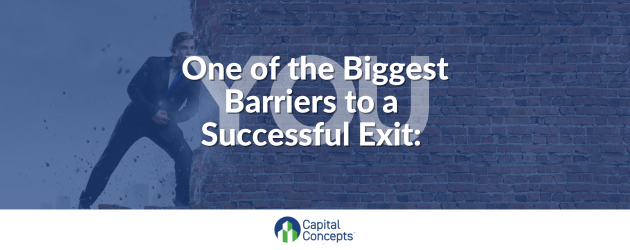It can be a self-perpetuating cycle: a business owner tells me she knows she needs to delegate so she can create bandwidth to plan ahead. But she can’t hand anything off because she hasn’t documented her processes which would allow someone else to follow the same steps and get similar results. Why hasn’t this happened? Because she doesn’t have time because she has so much on her plate. One of her biggest barriers is herself.

What Do You Want To Do?
I recently chatted with a client I’ve been working with about what his experience has been. Jim* said, “Lorne, I finally realized that my business would never grow if I kept insisting on doing or touching everything myself. I had to get out of my own way and empower other people to help.”
If this sounds familiar, you aren’t alone. And changing your perspective is simple (though not always easy). First, I recommend setting aside a little time and asking yourself a few questions:
- What do I want to do in my business?
- What am I best at?
- What would I delegate if I could?
- What do I want my life to look like now? How would I describe my ideal life today?
- What do I want my life to look like in a year? Five years?
Notice that these questions prompt you to step back from the minutiae and look at the bigger picture, both in your business and in your life in general. You’ve heard it before, and I’m going to remind you again – without a goal, you will find yourself off track. And you will remain one of your biggest barriers.
Now, let’s look at how you spend your time in your business.
Do a Time Audit

Before you can answer the questions about your business, you may need to do a time audit to see exactly what you do every day. I recommend keeping track for a week. Every hour, make a list of what you spent your time on, in 15-minute increments.
At the end of the week, look at your notes and identify the categories of tasks you do.
- What is administrative?
- What is financial?
- What is sales and business development?
- Are you still actively involved in operations? If so, how?
- Are you also involved in customer service or legal?
Then, quantify how much time you are spending in each of these categories.
What Can You Hand Off?
Now that you know what you’re doing as the head of your business, it’s time to delegate. The first step is to highlight the things you absolutely must be the person to do. Also take note of the areas you are best at. Before you can exit your business, you have to hand off everything, even these. For now, narrowing your scope to only what you as the CEO must do will create more space for you to plan your exit and make it happen.
Remember opportunity cost – if you’re doing mundane bookkeeping or administrative tasks, you’ve not only put your most skilled and expensive labor on that task but you have also lost that time you could have used for things only you can do.
With this in mind, look at the list of items remaining – the things others can do and are better at. This is where you start taking yourself out of the equation.
Are You One of Your Biggest Barriers?
If the idea of letting someone else handle approvals or quality assurance gives you hives, you may want to start with some of the easier tasks. However, you won’t begin to see an increase in your bandwidth until you empower someone else to approve work. Yes, it will take time, training, and allowing for mistakes to happen. In the long run, it is worth the effort and potential frustration today.
We recommend getting some additional input at this point. Your team can help you identify some quick wins to free up time immediately and let you begin to experience the benefits of delegating tasks. They can also help you decide who is best to hand various responsibilities to. An external advisor can also provide a neutral perspective devoid of any of the emotion and baggage that can accompany making changes like this. If you’ve had a bad experience in the past trying to delegate, you will have to work through your fear of repeating that.
In our next article, we’ll talk about the importance of thinking about your life outside of work. Creating a clear vision of what you’re working toward can help keep you focused and motivated to do the hard work of training and handing off responsibilities in your business.
This is the third article in a series on the importance of exit planning. Read the first two here:
*Name changed to protect anonymity
Related Articles
Get A Grip Roundtable
Does This Sound Familiar? Your business isn't as efficient or profitable as you'd like. You’re putting in the hours but not seeing the results you want. You’re stuck. You know your business has potential, but you're unsure how to take it to the next level. You’re...
Eight Ways to Exit Your Business
When it comes to exiting a business, most people assume there is only one way out: sale. But actually, there are 8 distinct ways to exit a business. Before considering your next move, it’s crucial that you understand each of these options to determine which is best...
The Formula for an Effective Exit Plan
Ask a business owner over the age of 50 when they plan to transition or exit their business, and you’ll get one of two answers:
– a blank stare, or
– “I’ll work another 5-10 years and call it quits.”(And if you ask this person again in another 5-10 years, you’ll likely get the same answer!)
The bottom line is the same – most business owners lack a plan for leaving their business. Read the article to learn what goes into an exit plan.

